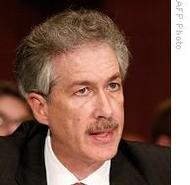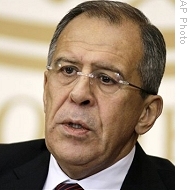State Department
13 February 2009
 |
| US Undersecretary of State for Political Affairs William Burns, (file photo) |
Officials here are giving no details of Burns's talks in Moscow. But they do not contest remarks attributed to him by Russia's Interfax news agency that the Obama administration is seeking Russian cooperation based on what Burns described as a "new configuration" on missile defense that would use resources both countries have.
Repairing the US-Russian rift
U.S.-Russian relations soured last year, due in part to a push by the former Bush administration for a missile defense system in central Europe aimed at what was framed as a looming long-range missile threat from so-called "rogue states,' principally Iran.
The Bush plan called for stationing of 10 interceptor missiles in Poland and a related radar system in the Czech Republic. Though the Bush administration offered Moscow transparency measures including on-site inspections, Russia adamantly opposed the program as a threat to its own missile deterrence.
Russia's Ambassador to NATO Dmitry Rogozin told the Reuters new agency Moscow would wait to see how the United States follows-up on Burns's remarks but he said if the Obama administration does review its missile defense plan, it would be a big gift to the region.
Diplomacy vs. missiles
At a news briefing, State Department Deputy Spokesman Gordon Duguid said it is heartening that Burn's remarks in Moscow were seemingly well-received.
He said the new U.S. administration still supports missile defense, provided it is threat-specific and that the technology for it proves feasible and cost-effective.
Duguid also said the need for a missile-defense system would diminish if efforts by the United States, Russia and other major powers to dissuade Iran from developing nuclear weapons can show success.
"We will pursue the issue of missile defense but obviously we are going to take into account a number of factors. One is whether the system works. Another is whether it is cost-effective. Another is the nature of the threat. If through strong diplomacy we and our other partners, including Russia can reduce or eliminate the threat, it obviously shapes the way we look at missile defense and its deployment," he said.
The United States along with the other permanent U.N. Security Council member countries and Germany - the P-5+1 - have offered Iran various incentives to stop a uranium-enrichment program U.S. and European officials believe is weapons-related.
Iran, which says its nuclear program is peaceful, has ignored three Security Council sanctions resolutions on the issue. The Bush administration wanted even tougher sanctions though Russia and China have to date resisted the idea.
 |
| Russian Foreign Minister Sergei Lavrov, (file photo) |
Secretary of State Hillary Clinton has not yet had a face-to-face meeting with Russian Foreign Minister Sergei Lavrov. But European Union chief diplomat Javier Solana said in Washington Friday they will meet March 6 in Geneva, a day after a NATO foreign ministers meeting in Brussels.